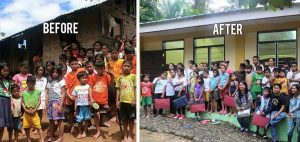DSWD IP youth shelter in Sultan Kudarat a ‘home away from home’ for Manobo children
News August 15, 2017, 0 Comment 0
The Department of Social Welfare and Development (DSWD), with the help of the Local Government Unit (LGU) of Kalamansig and officials and volunteers of Limulan, has transformed the temporary shelter of Manobo pupils in Kalamansig, Sultan Kudarat from a small makeshift shanty into one-storey concrete shelter that is complete with amenities.
Kalamansig, Sultan Kudarat – Manobo children in Limulan Village in this Municipality no longer have to cross rivers and trek hills for two hours everyday just to reach school. This is because the Department of Social Welfare and Development (DSWD) Field Office (FO) in Region XII, has brought them nearer to the school with the construction of the Indigenous People (IP) Youth Shelter.
A project worth P1.91 million, the IP shelter was built under the Kapit-Bisig Laban sa Kahirapan-Comprehensive and Integrated Delivery of Social Services (Kalahi-CIDSS) program of the DSWD, with the help of the Local Government Unit (LGU) of Kalamansig and officials and volunteers of Limulan.
“Mas ganahan na kami mu-eskwela kay lami na among estaran ug dili na me kinaghanglan mulakaw adlaw-adlaw (Our new shelter encourages us to study harder, as we do not need to trek daily going to school),” said Jolito Dalud, a 13-year-old Manobo youth with an inborn physical disability.
Jolito, born with a crippled left foot, together with at least 59 Manobo children, has to cross rivers and walk for two hours everyday to get to FB Concha Elementary School, the nearest school in their area.
“Ginakarga lang ako nila kung magtabuk kami sa sapa o kung kapoy na ko kaayo maglakaw (They carry me every time we have to cross rivers and whenever walking becomes unbearable for me),” Jolito shared while holding his crutch.
A few meters away from the school is a one-storey concrete shelter complete with basic amenities. Jolito and some 59 other Manobo children now have a decent space to stay in that is more conducive to learning. To date, the children now stay in the shelter for a week up to a month. Their parents bring them their daily food supply.
Apart from their new IP shelter, the 60 children also received an educational assistance of P500 each, through the Department’s Assistance to Individuals in Crisis Situation. The aid was given during the shelter’s turnover ceremony in June.
The pupils also received new school supplies, uniforms, and bags through a donation drive organized by the field office. They also received clothes, shoes, books and other donated educational materials from various individuals and organizations.
“The various support extended, especially the Kalahi-CIDSS IP youth shelter project, are a great encouragement to our school children who struggle going to school because of the distance and lack of a decent place to stay. Thank you for the DSWD’s help,” said Arnel P. Acuña, Teacher In-Charge of FB Concha Elementary School.
According to DSWD Secretary Judy M. Taguiwalo, the Department, through its field offices, is continuously providing assistance to indigenous peoples, especially those in far-flung areas through the various programs and services of the Department.
“The DSWD recognizes the plight of different IP groups, especially those in hard-to-reach areas where they do not have access to basic government services. To extend aid to them, we have started to look at our guidelines so we can implement programs and services that are tailored for them. We have also started to reach out to some IP communities and we will reach out to more in the following months,” Sec. Taguiwalo said.
Kalahi-CIDSS is one of the poverty alleviation programs of the national government that is being implemented by the DSWD. The program utilizes the community-driven development (CDD) approach, enabling communities in targeted poor and disaster-affected municipalities to identify their own needs, and collectively implement and manage solutions to these needs.###